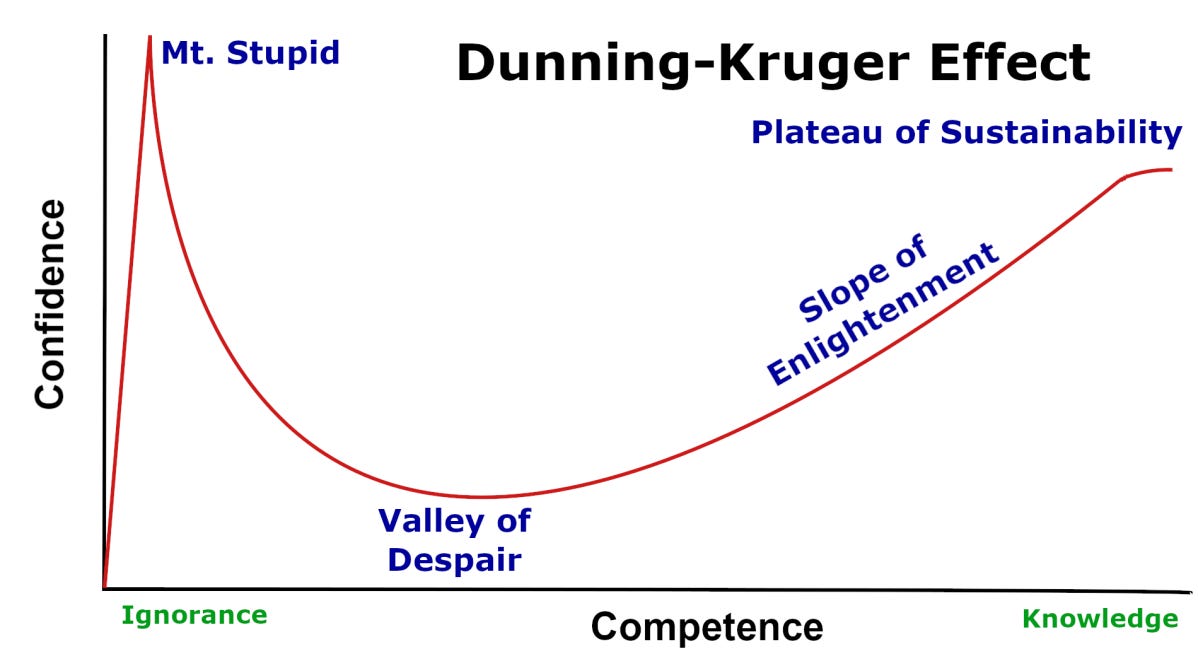In the last month or so, perhaps in the last three months even, I’ve developed a increased awareness of my limitations as a writer.
My sentences have a tendency to be too long (like the one above). I don’t vary the rhythm of them as much as I should. I gravitate towards idea based stories rather than emotional ones. I’m not very good at moving on from dead end plot lines. My grammar—or more importantly, my willingness to go back and line edit— could do with some improvement.
But I’m happy to know all this.
Why?
If nothing else, these limitations (which I’m working on) serve as some type of proof that I’m not suffering too heavily from the Dunning Kruger effect.
Dunning-Kruger effect1, in psychology, a cognitive bias whereby people with limited knowledge or competence in a given intellectual or social domain greatly overestimate their own knowledge or competence in that domain relative to objective criteria or to the performance of their peers or of people in general.
Basically, this is referring to people who don’t know anything about a topic, yet think they know EVERYTHING about a topic. (Yes there’s some irony in the fact that I’m stating this like an expert right now).
Now those of you who have who have scrolled through one too many of my sweeping claims on this page, may disagree with the statement that I’m not suffering from this effect, but I’ll try to make my case.
In the past I’ve definitely experienced this phenomenon. Gaining a surface level proficiency at some new skill and suddenly assuming that I know everything about it. I touched on a good example of this in one of my previous articles, when I pointed out the cocky new ‘fighters’ who used to turn up at my gym expecting to be elite right off the bat.
But deflecting this to a non-personal example here would be a cop out. I did the same thing myself when I started out in Jiu Jitsu. My most vivid memory comes from one of my first days at City Kickboxing.
I'd been training MMA for about a year and a half (at another gym) by this point and jumped in on one of the BJJ classes there. I got matched up with a purple belt named Chris. Perhaps he was tired that day, perhaps I caught him being too relaxed, but somehow I found myself in top position. From there, I managed to work his shoulder up to his head and lock up a technique called an arm triangle.
The aim of this choke is to block the far neck artery with your arm and use your opponent’s own arm to block off the other artery on the side closest to your head. Anyway, long story short, I got “close” to finishing the move, but Chris managed to escape.
In my mind, I was thinking, “man, I almost tapped a purple belt on my first day. I’m a natural at this.” I might have even congratulated him for managing to escape from that “tricky” situation.
Years removed from that incident, I cringe thinking about what must have been going through his head when I made that comment. In reality I wasn’t even close. What I didn’t know at the time, is how subtle the positioning of this technique is when performed correctly. While it is possible to use brute strength to finish the move on unskilled opponents, when attempting it on somebody who knows how to defend correctly, this approach will wear out your arms very quickly.
In all likelihood, Chris was defending the choke in ways that I was oblivious to, could feel that I didn’t have the right positioning and was simply waiting for me to get tired before ultimately escaping. This had the effect of making me “feel” I was close to making him tap, when in reality, I was miles away from anything like that.
My experience with this phenomenon is not limited to sport either. I’m guilty of taking books off library shelves at times, opening them up to a random page and thinking to myself, “I could do better than this. Right now, I am coming up with stuff that is better than this.”
Now, I’ve been writing for years by this point. This is something I’ve worked hard on, so perhaps this isn’t as clear an instance of Dunning Kruger as the example I used above. But, I’ll remind you of the opening line to this article. “I’ve recently developed an increased awareness of my limitations as a writer.”
When you scrape more than just the surface level of the Dunning Kruger effect, it goes into further detail about the learning process. It explores how after that initial spurt of overconfidence, a person on the path to mastery must enter the trough of “knowing that you know nothing,” before you can build yourself back up to some semblance of understanding. Some will argue, that even as you develop to an expert level in certain fields, this “knowing that you know nothing,” never really goes away and may in fact be the very thing that maintains that high level of effectiveness.
After that early over-confidence in MMA, I had to experience some very eye-opening reality checks before I was able to recalibrate my compass of perceived skill in a manner that matched up more closely with the real world. Only then could I see the mountain that lay ahead of me.
Right now, I’m at a liminal stage of my development as a writer. I’m submitting my work to agents and attend weekly critique groups where I read my work aloud. I’m opening myself up to criticism and assessment to a much higher degree than I have experienced before. Naturally, this influx of feedback has resulted in a slightly jarring correction of where I think I stand skill wise.
When I look at the above graph and compare it to my development as a writer, it scares me. Yet, at the same time, what I see here doesn’t quite ring true to my own journey. I’ve been through more than one of those “Valleys of Despair” before, and my version of the “Slope of Enlightenment” has a lot more downward kinks before it reaches that (in my case very brief) “Plateau of Sustainability.”
So I’m going to repeat my (perhaps wishful) diagnosis that my recent case of self-awareness isn’t a symptom of a recently shattered Dunning Kruger effect, but rather a healthy mid-stage correction in the natural learning process. Peaks and Valleys are all part of the game.
Right now I’m sitting in what I’d call a “Trough of Realism.”
It’s not a fun place to be, but it will make me better.
The nefarious thing about the Dunning Kruger effect is the way it allows you to live beyond what’s earned. If you’re not willing to wade into that “Valley of Despair” you don’t have to. The Dunning Kruger effect let’s you believe you are at a place you want to be, without requiring you to do the work.
The temptation is to ignore all negative feedback—write off criticism as subjective, “they just don’t get it. It’s them not me.” Anything to preserve the comfortable stability of delusion.
Perhaps it’s beneficial to entertain those thoughts from time to time. There’s certainly something to be said for “fake it till you make it.” But staying there permanently is a death sentence for any hopes of getting better. Growth and comfort can’t co-exist for long.
https://www.britannica.com/science/Dunning-Kruger-effect








